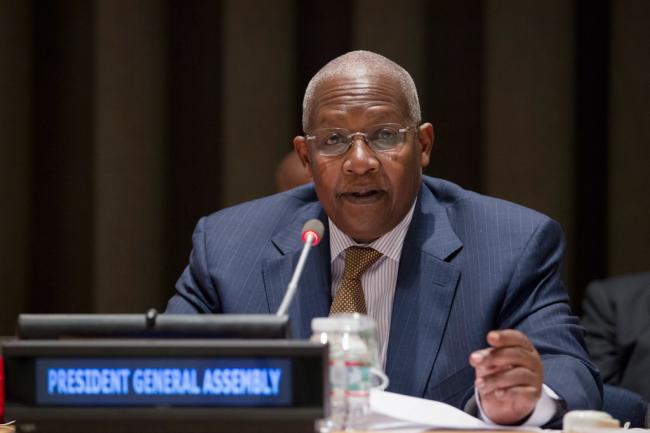Geopolitics
Governance/Geopolitics Accurate and timely data vital to post-2015 agenda: UN Assembly President
18 Apr 2015, 02:52 pm Print

New York, Apr 18 (JEN): At an event on Friday where participants discussed the importance of the data revolution to sustainable development, the President of the United Nations General Assembly stressed the importance of data to negotiations on the post-2015 development agenda and on financing for development.
“Data is an important tool for planning, monitoring, and accountability,” he said.
He added, “Particularly with regard to implementation at national, regional and international levels.”
Kutesa, who was speaking at a high-level side event during the World Bank & IMF Spring Meetings, entitled The Data Revolution for Sustainable Development, which aims to build support for financing the data revolution and to generate concrete ideas on how to make real advances for development data that can be taken forward in Addis Ababa and beyond.
He pointed to the proposed sustainable development goals, including goal 17 on means of implementation, which has a 2020 target for increasing significantly the availability of high-quality, timely and reliable data disaggregated by income, gender, age, disability, geographic location and other characteristics, as well as improving the statistical capacity of developing countries.
“Accurate and timely data enables policymakers to design and evaluate policies and programmes, and to ensure that resources are used as efficiently as possible,” he said.
Kutesa, who was speaking at a high-level side event during the World Bank & IMF Spring Meetings, entitled The Data Revolution for Sustainable Development, which aims to build support for financing the data revolution and to generate concrete ideas on how to make real advances for development data that can be taken forward in Addis Ababa and beyond.
He pointed to the proposed sustainable development goals, including goal 17 on means of implementation, which has a 2020 target for increasing significantly the availability of high-quality, timely and reliable data disaggregated by income, gender, age, disability, geographic location and other characteristics, as well as improving the statistical capacity of developing countries.
“Accurate and timely data enables policymakers to design and evaluate policies and programmes, and to ensure that resources are used as efficiently as possible,” he said.
He added, “Quality data will be essential for follow-up and review of the post-2015 development agenda.”
That would be vital to fulfilling the ambitions of a transformative post-2015 agenda with hopes of eradicating extreme poverty, improving livelihoods of people everywhere and preserving the planet.
To implement the new agenda and to work towards achieving sustainable development it would be vital to mobilize adequate financial, technological and capacity building resources.
That would be vital to fulfilling the ambitions of a transformative post-2015 agenda with hopes of eradicating extreme poverty, improving livelihoods of people everywhere and preserving the planet.
To implement the new agenda and to work towards achieving sustainable development it would be vital to mobilize adequate financial, technological and capacity building resources.
Timely, reliable and accessible data would be equally important, he added, stressing that it could otherwise constrain implementation of policies and programmes.
“Data is a cross-cutting issue in many areas of the post-2015 agenda,” Kutesa said.
“Data is a cross-cutting issue in many areas of the post-2015 agenda,” Kutesa said.
He added, “The changing data and technology landscape means that we need to draw on the assets of all actors including governments, the UN system, international financial institutions, civil society, business, academia and others.”
Photo: UN Photo/Rick Bajornas
Photo: UN Photo/Rick Bajornas
More Geopolitics
- Sri Lanka: 6.2 magnitude earthquake hits Island Nation, no casualty
- UN chief hails SE Asia for vital role ‘building bridges of understanding’
- India-Uzbekistan Synergy at the SCO
- Kazakhstan to host Astana International Forum in June to address key global challenges
- Japan, Vietnam to work together to tackle China in nearby water: Reports






